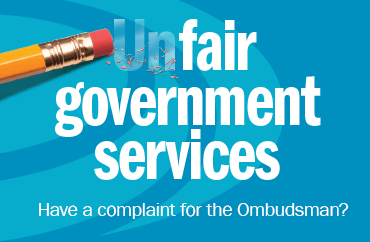Ombudsman Reflects On 2017…
Annual reports for Saskatchewan’s Ombudsman and Public Interest Disclosure Commissioner, Mary McFadyen, were tabled in the Saskatchewan Legislature today. In the Ombudsman report, McFadyen noted that municipal complaints continue to rise and municipalities are still learning how to deal with her Office. The report includes summaries of cases in which she made recommendations to provincial ministries and agencies, including recommendations that correctional centres need to accurately record and properly retain video footage of incidents. She said, “We had two cases this year that we could not fully investigate because the video record was unavailable or incomplete.”
The Ombudsman received 3,298 complaints about provincial and municipal government, including ministries, Crown corporations, agencies and publicly-funded health entities, and cities, towns, villages, resort villages, rural municipalities, and northern municipalities. While Social Services and Corrections were still the top two complaint areas, municipal issues were the third most frequent at 17% of complaints. Many of these were about council member conflicts of interest. McFadyen says that some municipalities were reluctant to provide information to her staff, unlike provincial ministries and agencies, who understand the Ombudsman’s role and cooperate with her Office. She said “We know this is because we are still new to municipalities, so we will continue to reach out and educate them about our Office. Our investigations are aimed at helping municipalities improve the way they carry out their roles and ensuring they deal with their residents in a fair manner.”
McFadyen also said “We want people to know that we can still take their health complaints, just like before. We want to remind the public of this, given the transition of 12 health authorities into one in December 2017.” The report includes recommendations made to former health regions to improve a concern-handling process, and to improve information provided to families and residents of a long-term care home. The Ombudsman also has a role in resolving issues, and the report includes an example involving a struggle to find a long-term care space close to a resident’s family.
As Public Interest Disclosure Commissioner, McFadyen published summaries of three investigations, noting that the Office received a similar number of inquiries and disclosures of allegations of wrongdoing as it did in 2016 and 2015. Of the formal investigations summarized in the reports, two resulted in recommendations about video documentation in correctional facilities.
As Ombudsman, McFadyen investigated a complaint from “Norma”, an inmate at the White Birch Remand Centre who was restrained for five hours in a WRAP device. The WRAP consists of a shoulder harness, an ankle binding, and a blanket with straps that encircle and restrain the legs. While there was a policy to use the WRAP on youths in custody, the WRAP had not been approved for use on adult women. At the time, the WRAP was not authorized for use, and the way it was used was not reasonable. After the incident, Corrections drafted a policy to allow for its use on adult women. McFadyen recommended that Corrections give Norma a written apology, and that it review its draft policy to ensure that it addressed the needs of adult women, that basic human dignity would be preserved, and that it included reasonable time limits for use of the WRAP, sufficient monitoring, and proper video and audio recording of the WRAP’s use.
As Public Interest Disclosure Commissioner McFadyen received an allegation that excessive force was used on an inmate. Based on the allegations, her staff requested video of the incident, but the correctional centre’s practice was to only keep video recordings for 30 days, and it was no longer available. The Corrections staff involved in the alleged incident provided conflicting information, so a video would have been valuable objective evidence. She recommended that video recordings be fully retrievable for a reasonable period. McFadyen said, “Quality audio-visual records that are accurate and complete are vital in providing unbiased evidence. Some improvements have been made, but there needs to be more consistency and better recordings.”
The Ombudsman’s annual report is available at www.ombudsman.sk.ca and the Public Interest Disclosure Commissioner’s annual report is available at www.saskpidc.ca. The Ombudsman and Public Interest Disclosure Commissioner operate under The Ombudsman Act, 2012 and The Public Interest Disclosure Act. She is an officer of the Legislative Assembly. Her Office promotes and protects fairness and integrity in the design and delivery of government services.
– 30 –
Media Contact
Leila Dueck
Director of Communications
Phone: 306-787-7369
Email: ldueck@ombudsman.sk.ca




